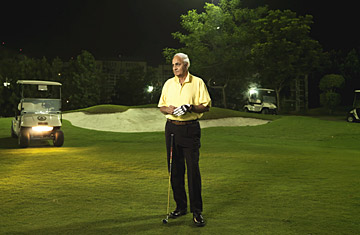
TOP OF THE WORLD: DLF chairman K.P. Singh says the windfall from his company's IPO "is embarrassing to me. That is not the yardstick by which I want to be known."
(2 of 3)
By the time he joined DLF in 1960, real estate development work had dried up completely. Instead, the company tied up with two U.S. firms to manufacture electric motors and automotive batteries. Although the battery joint venture eventually foundered, Singh says he learned a lot about American management techniques during the period. By 1980, he had hit upon a new scheme that would eventually help transform India. "I was hungry," he says now. "And the best things in life are done when you are hungry for more business."
Singh's plan centered on Gurgaon, a dry, scrubby plain in the state of Haryana, just across the border from New Delhi. If he could buy enough land and then convince authorities to change their regulations, perhaps he could outdo his father-in-law's success in New Delhi. By 1981, though, the company had acquired just 40 acres. Singh had failed to persuade the state government to change a law preventing companies from acquiring farmland for commercial use. Frustrated and despondent, he sat beside a well one scorching summer day. "What the heck can you do in this place?" he recalls asking himself.
That was when the driver of an overheating four-wheel drive stopped to request some water. The supplicant was Rajiv Gandhi, son of Prime Minister Indira Gandhi and soon to be India's leader himself. "Rajiv Gandhi was like a ray of hope for India," says Singh, who hit it off with the political scion and was later repaid for his water when Gandhi pushed the Haryana state government to ease commercial-development restrictions on farmland. "It didn't take me any time to convince him, frankly," Singh says. "We found that we were on the same wavelength very quickly." Their two-hour conversation that day as Gandhi's car cooled, says Singh, was "the birth of the entire urban-development policy of India today."
Over the next two decades, as economic regulations were slowly liberalized, DLF amassed 3,500 acres in Gurgaon and began building some of India's first modern commercial structures, including offices for General Electric and, more recently, for Swedish cell-phone maker Ericsson and Swiss food giant Nestlé. The company also built luxury apartments and houses, including one residential estate incorporating an 18-hole golf course designed by golfing legend Arnold Palmer. Land that cost Singh as little as $65 an acre at current exchange rates now sells for about $4 million an acre. Meeting Gandhi "was lucky in one way," says Singh now. "But it wasn't only luck. It gave me an opportunity to fight."
Singh has also had some pretty good advisers in his corner. Former General Electric CEO Jack Welch became a fan after the DLF chief helped set up Welch's first visit to India in the 1980s. In his autobiography, Welch wrote that Singh — whom he described as "tall, natty and aristocratic" — and his friends "showed us an India and a people that we loved. We saw all kinds of opportunities there." Singh later became a GE adviser. "I learned a lot from Jack Welch about how to run a business," he says.
In the run-up to its IPO, DLF has been on another buying spree. Holdings in 31 cities now have the potential for 570 million sq. ft. (53 million sq m) of development, according to the company — more than double the amount that DLF has completed over the past few decades. The company likes to think big. Last year DLF began work on the Mall of India in Gurgaon, which will be one of the five biggest shopping complexes in the world. It has just opened a new technology park in Chennai; tenants include Symantec and IBM. In recent years, it has tied up with a host of foreign companies to develop airports (in partnership with Fraport AG, owner and operator of Frankfurt Airport), hotels (Hilton), and industrial estates and urban hubs (Dubai-based developers Nakheel). "Our collaborations are all with the very best from abroad," says DLF's energetic group executive director Rajeev Talwar. "We want to bring global best practices to India."
Over the past few years, Singh has handed over much of the day-to-day running of DLF to his son and DLF vice-chairman Rajiv Singh, 48, who studied engineering at Massachusetts Institute of Technology (the younger Singh declined requests to be interviewed for this story). Daughter Pia, 36, a Wharton economics graduate, runs the company's retail business. Older sister Renuka handles some international business. K.P. says he plans to slowly step away from DLF to concentrate on his golf (handicap: 14), collect more art (DLF owns one of the biggest private collections in the country) and travel (Singh is the Honorary Consul General of Monaco and holidays in London regularly). "He's a perfectionist who will move heaven and hell if he wants something," says Pia, who recalls watching her father take over a hospital ward after her mother was badly injured in a helicopter accident that killed four other people. "He managed her case how he ran the business. He literally gave up everything for two years."